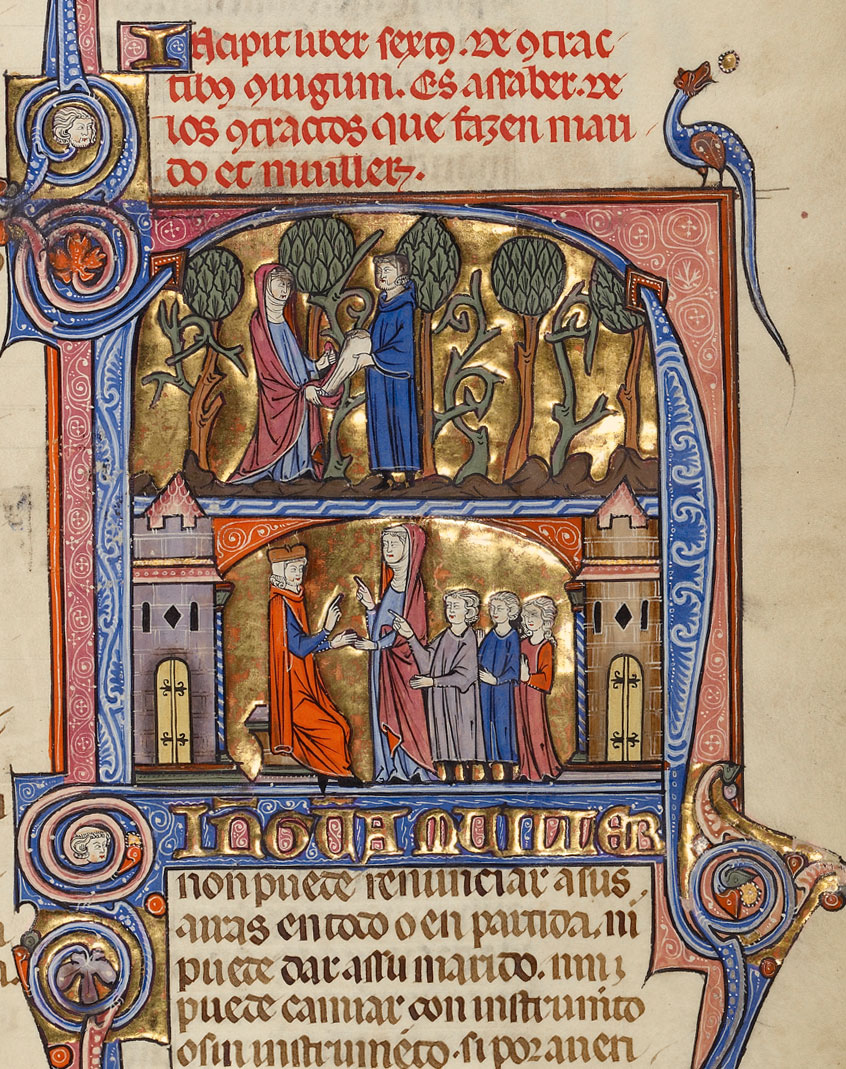
Unknown, Michael Lupi de Çandiu,1297 – 1305, Initial N: A Man Emptying a Money Purse into a Woman’s Mantle and A Woman with Three Children before a Judge, about 1290 – 1310, courtesy The J. Paul Getty Museum, Los Angeles.
Trusts
Many of our clients opt to include a trust in their estate plans. Why use a trust?
Today, Americans in all income brackets can use trusts to achieve financial management and family goals.
In the past, the most common reason to establish a trust was to make use of a spouse’s full estate tax exclusion amount. Federal law has increased the individual estate tax threshold to $13.61M ($27.22M for a couple) and “portability” now allows the estate of a surviving spouse to benefit from any unused federal estate tax exemption of the first spouse to die.
The high federal threshold beneath which there is no estate tax means that in states like New Mexico, which does not have a lower state estate tax threshold, few American families will pay estate tax. For almost all Americans, the high estate tax exclusion amount means that a “bypass” or “credit shelter” revocable trust is no longer necessary for the purpose of sheltering assets against estate tax. However, a revocable trust is still very useful to provide for secure management of assets in incapacity, to protect beneficiaries who need assistance in financial matters, to manage family real property or intellectual property or creative assets and art collections, and for other purposes. Trusts are flexible and customizable financial management tools.
High value estates continue to look to a variety of trust forms that provide tax advantages and facilitate family wealth management or benefit charities. Here are some types of commonly used trusts:
Bypass or “B” trust and QTIP trusts
Bypass and Qualified Terminable Interest Property (QTIP) trusts provide income or principal for a surviving spouse. Upon the spouse’s death the assets then go to additional beneficiaries named by the deceased. Often used in second marriage situations, as well as to maximize estate and generation-skipping tax or estate tax planning flexibility.
Testamentary trust
A testamentary trust is created within a will. The trust does not take effect and property does not pass into the trust until death. The will contains the trust provisions and serves as the trust document. Of limited use, since it does not provide for the transfer of asset management to another in the event of incapacity. Testamentary trusts are often used to manage the property of children or grandchildren until the child reaches a certain age. Assets may be distributed over time or be used for specific purposes such as education. Only effective after death; funds are subject to probate and transfer taxes, if any.
Irrevocable trust
In an irrevocable trust, the settlor gives up ownership and control of the property placed in the trust. One result of this choice is that assets placed in an irrevocable trust may not be included in the settlor’s estate at his or her death.
Irrevocable life insurance trust (ILIT)
Irrevocable trust designed to exclude life insurance proceeds from the deceased’s taxable estate while providing liquidity to the estate and/or the trusts’ beneficiaries.
Charitable lead trust
Benefits a charity for a defined period of time, then passes remainder, if any, to beneficiaries. A charitable lead trust makes payments, either of a fixed amount or a percentage of trust principal to charity during its term. At the end of the trust term, the remainder can either go back to the donor or to heirs named by the donor. The donor may sometimes claim a charitable income tax deduction or a gift/estate tax deduction for making a lead trust gift, depending on the type of a charitable lead trust.
Charitable remainder trust
Provides an income stream for a defined period of time and gives a remainder to charity. For example, a trust could provide income to a surviving spouse for his or her lifetime. The donor may claim a charitable income tax deduction. At the end of the trust term, the charity receives whatever amount is left in the trust.
Generation-skipping trust
Using the generation-skipping tax exemption, permits trust assets to be distributed to grandchildren or later generations without incurring either a generation-skipping tax or estate taxes on the subsequent death of your children
Special needs trust
Special needs trusts are established in order to permit a disabled or mentally incapacitated person to have the benefits of property held for his or her use without granting control of assets to that individual. A trustee manages the property, ensuring that the assets are not used for food, shelter or other countable expenses and thereby enabling the disabled person to retain Medicaid eligibility and certain government benefits. The assets of special needs trusts established with the property of the disabled person are subject to claim by Medicaid on the person’s death. The remaining assets of a special needs trust established by a third party such as a family member may pass to another beneficiary on the death of the disabled person.
Honorary trust
Honorary trusts are used to care for a person’s pets or provide for the maintenance of cemetery plots. In the case of trusts for animals, the trust terminates after the earliest of when no living animal is covered by the trust or 21 years. A court may reduce the amount of the property transferred to an honorary trust if it determines that amount substantially exceeds the amount required for the intended use.
Information on this website is not legal advice or a substitute for legal advice. The transmission or receipt of the information contained on this website does not create an attorney-client relationship, and you should not act upon such information without seeking professional counsel. This website contains links to other websites. Fitz Gibbon Law, LLC does not necessarily endorse, sponsor, or otherwise approve of the materials at such sites.